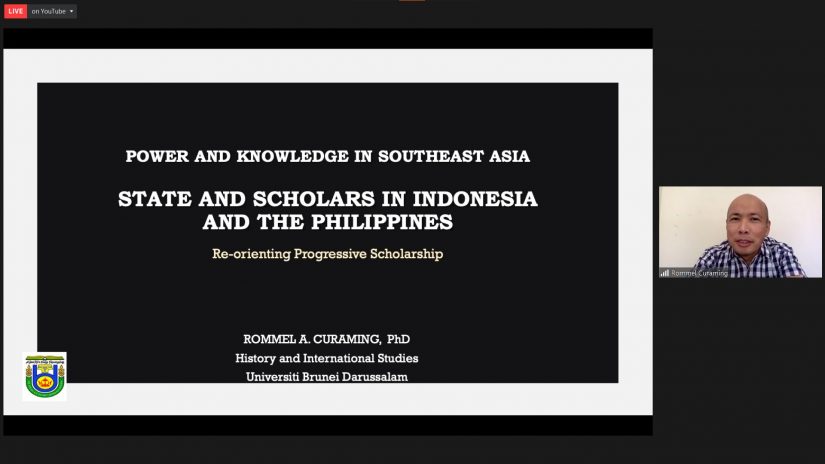
Department of History UGM held a series of online discussions and book reviews with Rommel Curaming, Ph.D., from University of Brunei Darussalam. The series of online discussion and book review events will be held for two days, namely Wednesday and Thursday, December 8-9, 2021. Both series of events were held through the Zoom Meeting platform and broadcast live on the UGM History Department’s YouTube channel.
The online discussion is held from 16.00 to 17.30 WIB. The online discussion was opened by Satrio Dwicahyo as a representative from the UGM History Department and was later taken over by Yuanita Wahyu Pratiwi as moderator. After that, Rommel Curaming started the discussion by making a presentation. Budiawan, Ph.D, a senior lecturer in Cultural and Media Studies at the Graduate School of Gadjah Mada University, was also the discussant in this first series of discussions.
The first day of online discussion raised the title Enrique Melaka/Maluku: History and Heritage War Between Indonesia and Malaysia. Rommel Curaming, Ph.D. provides case examples regarding the shared historical debate between Indonesia and Malaysia. According to many historical publications, Enrique, the European name of a native of Southeast Asia, served as a voyage guide for two famous Spanish sailors, Ferdinand Magellan and Juan Sebastian Elcano. Much of Southeast Asia’s popular history emphasizes that Magellan and Elcano would not have operated without Enrique’s guidance. Because of this role, Enrique has been named the first Southeast Asian to sail around the world. Then a historiographical dispute arose which debated about Enrique’s last name and Enrique’s origin from Malacca or Maluku. Indonesia and Malaysia seem to be fighting over the history of Enrique’s origins. In addition, since around the 15th century, Malacca and Maluku are two sites that have a long and important history in the midst of global maritime networks. This online discussion also discusses the important reasons for the existence of Malacca and Maluku for Indonesians and Malaysians in the 21st century today.
Second day discussion raised the title Towards Re-Orienting Progressive Scholarship: Rethinking the State-Scholar Relations in Indonesia and the Philippines. The discussion, which was held at 10.00 – 11.30 WIB, focused more on discussing the book Power and Knowledge in Southeast Asia: State and Scholars in Indonesia and the Philippines written by Rommel Curaming in 2020. The book review was opened by Satrio Dwicahyo as moderator which was then continued by Dr. Abdul Wahid, M.Hum., M.Phil., Head of the History Department, FIB UGM to give the opening remarks. Then, Rommel Curaming P.hD. immediately presented his explanation of the book. Besides Curaming, Prof. Bambang Purwanto, a professor at the Department of History, Gadjah Mada University, Yogyakarta, was also a speaker in this session. In its implementation, Prof. Bambang Purwanto asked a number of questions which were also the triggers for the discussion of this book review.
The book review in this second series emphasizes the possibilities for Indonesia and the Philippines on the same trajectories in their historiographical development. Curaming also tries to place a historical writing project from Indonesia, namely the National History of Indonesia, and the Philippines, namely the Tadhana Project in this book. The two projects can be said to be the product of two dictatorships from each country: Suharto (Indonesia) and Ferdinand Marcos (Philippines). The relationship between scholars and state-run power is also well explained by Rommel in this book.
Here the documentation of two event:
Author: Nasywa Nur Athiyya dan Helga Natasha KS
